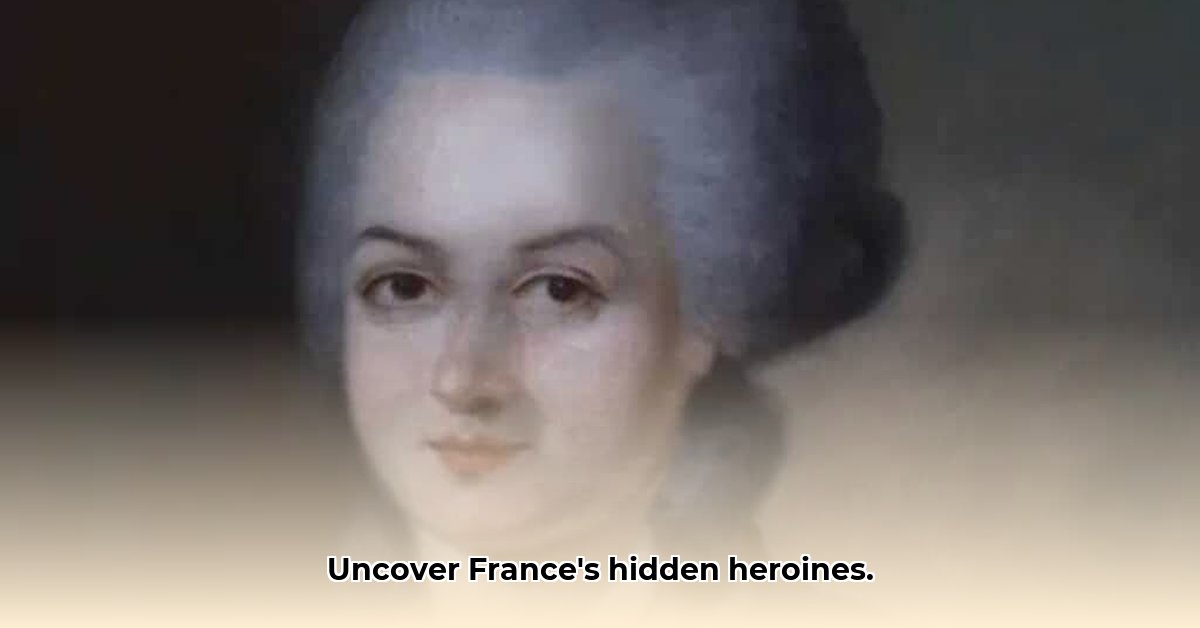
Revolutionaries: Shaping a Nation Through Courage and Conviction
The French Revolution was not solely a male endeavor; women played pivotal roles, often facing immense risks to champion their beliefs. Their contributions, sometimes overshadowed, are crucial to understanding this transformative period. For more inspiring French women, check out this list of famous French women.
Olympe de Gouges (1748-1793): A playwright and activist, de Gouges fearlessly challenged the patriarchal structures of her time. Her Declaration of the Rights of Woman and of the Citizen, a powerful response to the Declaration of the Rights of Man and of the Citizen, boldly demanded equal rights for women. Her execution during the Reign of Terror underscores the dangers she faced in pursuing her cause. "Olympe de Gouges's radical ideas were far ahead of her time, a testament to her unwavering commitment to social justice," states Dr. Annelise Rieux, Professor of History at the Sorbonne University.
Madame Roland (1754-1793): A prominent figure in the Girondin faction, Madame Roland was a gifted writer and salonnière (host of social gatherings). Her political writings and insightful observations significantly influenced revolutionary discourse. Despite her privileged background, her dedication to republican ideals and eloquent writings cemented her place in history. Her sharp wit and political acumen allowed her to significantly influence the course of the Revolution, showcasing the power of intellectual engagement even within a highly volatile political atmosphere. The impact of her salons, described by historian Dr. Jean-Pierre Dubois of the University of Paris, as "crucibles of revolutionary thought", were invaluable to the political climate of the time.
Did you know that women's participation in the French Revolution was far more widespread than often portrayed? Their roles extended beyond the prominent figures highlighted here, enriching a narrative still in the process of being fully uncovered.
Artists & Writers: Mastering Expression and Defying Conventions
French artistic and literary traditions have long been revered, yet contributions from women often remain under-recognized. The following women challenged norms and left indelible marks on their respective fields.
George Sand (1804-1876): A prolific novelist and essayist, George Sand (Amantine Lucile Aurore Dupin de Francueil) challenged societal expectations through both her life and her work. Her exploration of complex characters and social issues in novels like Indiana defied conventions. Her unconventional lifestyle, including dressing in men's clothing, also directly confronted gender roles of the 19th century. "George Sand's literary output was groundbreaking, not just for its stylistic innovation but also for its unyielding critique of societal norms," commented Dr. Isabelle De Valois, a renowned scholar of 19th-century French literature from the Collège de France.
Rosa Bonheur (1822-1899): A renowned animal painter, Bonheur broke barriers in a male-dominated field. Her mastery of realism in capturing the essence of animals established her as a leading figure in the artistic landscape. Her persistence in pursuing her artistic passion, despite gender-related challenges is inspiring. Her work, often on a grand scale, earned international recognition, celebrating naturalism above all else.
How did these women manage to achieve such recognition in fields that actively sought to exclude them? Their dedication, talent, and resilience against substantial adversity provide profound lessons about perseverance.
Royalty & Nobility: Navigating Power, Intrigue, and Change
French royalty and nobility often saw women involved in political power plays, as well as societal shaping. Their lives are filled with both glamour and tragedy, offering fascinating insights into an era of immense change.
- Marie Antoinette (1755-1793): The Queen of France, Marie Antoinette's life remains endlessly fascinating and debated. Her extravagant lifestyle and controversial actions contributed to growing discontent before the Revolution. However, exploring her life requires a nuance that appreciates her role beyond simple caricature. Her patronage of the arts and her position as a mother, caught within the maelstrom of the French Revolution, offer a more complex picture that deserves to be explored.
The lives of royal women, often shrouded in mystique, provide a glimpse into the workings of power, the complexities of court life, and the impact of individual women on the broader historical narrative.
Scientists: Pushing Boundaries of Knowledge
While often overlooked, numerous French women made significant contributions to science and mathematics. These women deserve recognition for their intellectual achievements.
- Émilie du Châtelet (1706-1749): A physicist and mathematician, du Châtelet's translation and commentary on Isaac Newton's Principia Mathematica significantly advanced the dissemination of Newtonian physics in France. Her own work on energy conservation further demonstrated her substantial scientific expertise.
The underrepresentation of women in science is a historical reality. Highlighting these contributions provides a more truthful representation of scientific advancement.
Fashion Icons: Defining Style and Shaping Trends
French fashion has long set global trends, and women have been central to the evolution of those trends. Their impact extends beyond mere aesthetics, reflecting changes in social attitudes and women's roles.
- Coco Chanel (1883-1971): Gabrielle Bonheur "Coco" Chanel revolutionized women's fashion through her simple yet elegant designs. Her iconic little black dress and other innovations modernized women's clothing, freeing them from restrictive Victorian styles. "Chanel's impact on 20th-century fashion is immeasurable," remarks fashion historian Dr. Vivienne de Montaigne of the Musée Galliera. Her designs liberated women, making comfortable, stylish clothing available to a wider audience.
The stories of these fashion pioneers deserve more than just admiring glances – they reflect substantial societal changes through the design and creation of clothing.
By recognizing these incredible women and their achievements, we gain a richer, more complete understanding of French history. Their stories are not just fragments of the past; they are vital threads in the ongoing tapestry of human achievement.